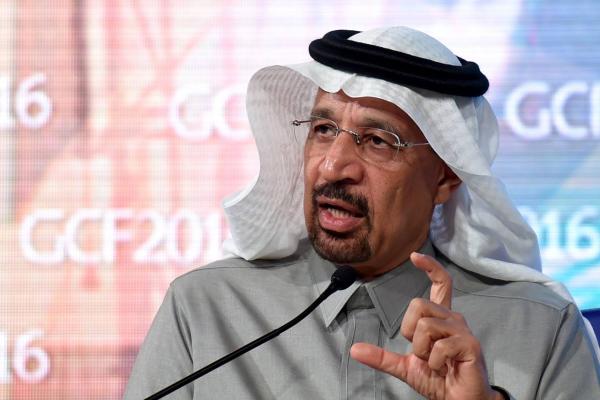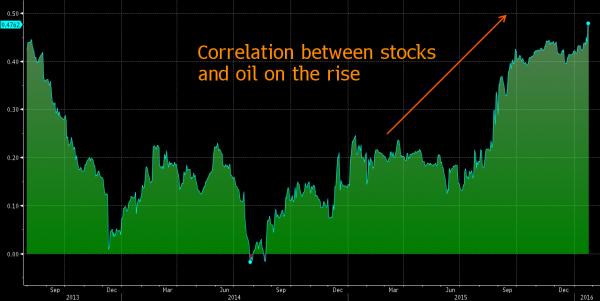After the biggest two-day surge in oil in seven years, early in the overnight session both Brent and WTI continued their run for a third day, entering a bull market, 20% up from recent lows hit just last week (yet still 15% down on the year) when Saudi Arabia spoiled the momentum party afterthe world’s biggest crude exporter said it’s keeping up investments in energy projects while diesel consumption in China dropped for a fourth consecutive month, signaling an industrial slowdown.
WTI reversed course and futures dropped as much as 4.1% in New York when Saudi Aramco Chairman Khalid Al-Falih announced his company hasn’t reduced its investment capacity amid lower crude prices, suggesting that oil will remain oversupplied for the foreseeable future. As a result, West Texas Intermediate for March delivery dropped as much as $1.33 to $30.86 a barrel on the NYMEX and was at $31.14 at pixel time after rising as high as $32.74 earlier. “The Saudi news surely would give a little bit of a worry that production would remain strong,” Daniel Ang, an investment analyst at Phillip Futures, said by phone from Singapore. “The main reason for oil losing steam still comes from the fact that oil markets are currently in oversupply.”

Khalid al-Falih, the chairman of Saudi state oil giant Aramco, addresses the 10th Global Competitiveness Forum on Monday. He said that a moderate oil price would be reached before long. Photo: Agence France-Presse/Getty Images
Elsewhere, diesel use in China dropped 5.6% in December compared with a year earlier and gasoline consumption grew at the slowest pace in more than two years, confirming it is not just growing supply but slowing demand – something the DOE confirmed last week – that is the culprit for record oil stockpiles. “The China demand figures is a stark reminder that consumption growth may not be stellar in 2016,” Bjarne Schieldrop, Oslo-based chief commodities analyst at SEB AB, said by phone. “Prices needs to stay weak for some time at least in order to keep excess production out and help rebalance the market later.”
Since algos continue to track every risk tick-for-tick with oil, as seen by the Bloomberg chart below showing the near record correlation between equities and oil, global stocks and US equity index futures initially rose only to slide following the Saudi Aramco comments, as stocks and the currencies of exporters were dragged down, while havens, including gold and the Japanese yen, rallied.

“The correlation between oil prices and equities has turned positive,” former Goldmanite Erik Nielsen, chief global economist at UniCredit Bank AG, wrote in a report to clients on Sunday. It’s “wrong, and therefore temporary,” he wrote. “When oil prices drop, it reduces the transfer of income and wealth from oil-consuming countries, like Europe, to oil-producing regions, like the Middle East and Russia. Since the ‘winners’ in Europe have lower savings ratios than the ‘losers’ this is all good for growth.”
For now, of course, it is Nielsen who is wrong as the latest snapshot of global risk confirms:
Flipping quickly through regional markets, we start in Asia where equity markets traded higher in a continuation of the gains seen late last week amid prospects of central bank easing and a rebound in the energy complex . The ASX 200 (+1.8%) and Hang Seng (+1.4%) were led higher after crude posted its largest 2-day gain in 7yrs to climb back above USD 32/bbl. Shanghai Comp (+0.6%) was further bolstered by reports that the PBoC are planning as much as CNY 800bIn of mid-term liquidity support, while the Nikkei 225 (+0.9%) surpassed the 17000 level after shrugging off weak Japanese trade figures, underpinned by a weaker JPY. 10yr JGBs traded higher despite the firm risk on tone in the region, supported by hopes of further central bank easing while the BoJ were also in the market for 5yr-10yr government debt.
Elsewhere in Japan, BoJ Governor Kuroda said Japan’s underlying price trend currently looks solid and reiterated that the BoJ will not hesitate on further easing if needed to reach its price target, but could not comment on whether BoJ will ease this week or not.
Top Asian News
In Europe equities have been choppy this morning, despite initially following Asia’s lead and opening in positive territory (EuroStoxx -0.10%). Equity indices are mixed as North American participants come to their desks, as the risk tone for markets is somewhat uncertain.Total SA and BP Plc lost more than 1 percent on Monday, while Rio Tinto Group also dropped 1 percent after oil weighed in early trading after Aramco’s comments.
Banca Monte dei Paschi di Siena SpA advanced for a third day, taking its surge in the period to a record 50 percent. Greece’s ASE Index climbed 1.5 percent after Standard & Poor’s upgraded the country to B- from CCC+, with a stable outlook.













Leave A Comment